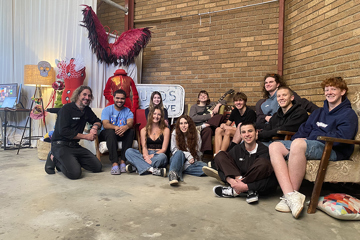'I Don't Like Nostalgia' Says The Cult's Ian Astbury
The band will play their 1987 album Electric in full on their forthcoming tour.

"I don't like nostalgia,” states Ian Astbury, lead singer of seminal rock band The Cult. It's a somewhat paradoxical position to hold, when we're on the phone to talk about The Cult's impending Australian tour in which they will play 1987's Electric album in its entirety. Electric is famous not only for the singles Love Removal Machine and Wildflower, but also for being the album which, under the wing of visionary producer Rick Rubin, transformed The Cult from pasty British, pirate-shirted goth types to internationally loved, hard rock hot property.
Astbury sounds animated as he recalls those early years. “It was 1985, at a nightclub in Toronto, when I first heard the Beastie Boys song Cookie Puss and I had to find out who produced it! I loved the stripped-back sound of it and I realised that was the way The Cult should be produced. We were 24 years old at the time, out on the road and playing rock'n'roll, we wanted something to capture that feeling in the studio.”
Astbury's Torontonian epiphany took The Cult to the chaotic freak scene that was Manhattan in the mid-'80s, to meet Rubin, who as a first priority sat the band down for a serious session of listening to a '60s psych rock/proto metal band.
“We sat down with Rick in a New York dorm room and he played us a Blue Cheer video, then asked, 'This is how I can see you guys sounding, more stripped back and direct.. Do you want to do this?' Billy [Duffy, guitarist] and I looked at each other and said, 'Hell, yes! Definitely'.”
Don't miss a beat with our FREE daily newsletter
Saying yes to Rubin, in hindsight, was obviously one of the most pivotal points in The Cult's career. It gave them much-desired international adulation, and the opportunity to change both sound and image. But even at the time, recording in New York, the band were instantly aware that they weren't in the Batcave anymore.
“Working with Rubin in 1986 in New York, we were hanging around at Def Jam with Rick and the studio was a meeting place for everybody on the label. LL Cool J, Run DMC, Beastie Boys – they all seemed to turn up, particularly around dinner time,” Astbury laughs. “It's tough trying to convey what New York was like at the time – 'lawless' is a good word. People got killed, or shot, just around the corner from where I lived, Washington Square, which was really close, had drug deals going on all the time – muggings.”







